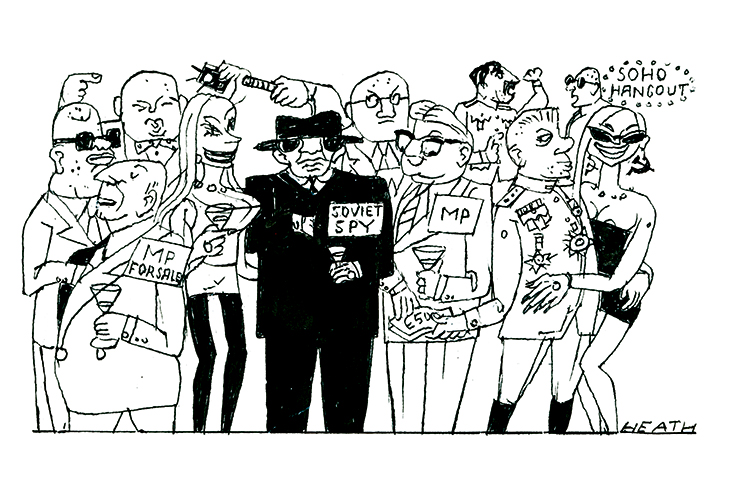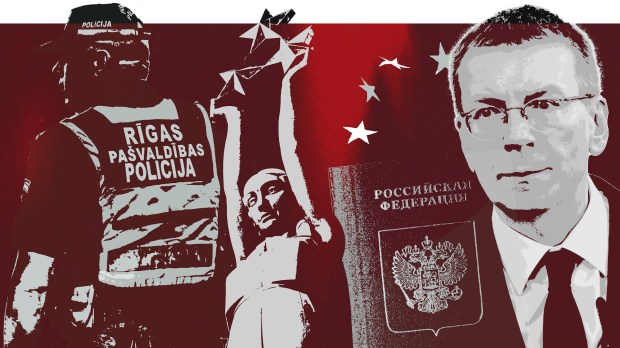I first met Sergey Nalobin in 2012 at Soho House. He introduced himself, in accented English, as from the Russian embassy. ‘On the Ministry of Foreign Affairs orientation course before coming to London, I was told to read Guido Fawkes blog and Private Eye. I enjoy yours more,’ he said flatteringly (I publish Guido Fawkes). A PR company had offered me an irresistibly large fee to give ‘a masterclass’ to corporate marketing types in how to use social media. So it was that I found myself presenting Power-Point slides in front of a boardroom of suits — with one short, heavy-set, cropped-haired Russian from central casting sitting right next to me.
Later, over burgers, we exchanged banter. I immediately suggested he was a spy. He said the Cold War days were over — Russia just wanted to be friends. Sergey wanted to know how the website worked, how it was funded, and how I got my information. He was particularly interested in any gossip I might have about David Cameron and George Osborne.
After that, I would see Sergey at events around Westminster. He popped up at any Tory shindig where he could network. He had a great, dry sense of humour and was well aware that anyone meeting him would suspect him of being more than just an innocent ‘political first secretary’. His Twitter profile described him as a ‘brutal agent of the Putin dictatorship :)’ and his feed was full of selfies with the likes of William Hague, then foreign secretary, and the current one too, Boris Johnson. His Facebook photos showed him at a fancy dress party dressed in a Russian military uniform with ‘KGB’ written on his hat — handgun in one hand, the other on a racy girl in stockings and suspenders, who was definitely not his wife. I once accepted his invitation to a summer reception at the Russian embassy in Kensington Gardens, which as well as being vodka–fuelled fun, was made memorable by the former security minister Admiral Lord West chatting up my date.
Very soon afterwards, Guido’s advertising salesman told me he had sold a four-month advertising campaign to the Russian embassy. In fact, he had sold advertising on a string of political blogs from across the spectrum, and many of those bloggers went on a freebie trip to Moscow. I declined to go, partly because I did not want to wake up in a hotel room wondering what had happened the night before, and worrying if there were pictures.
Another invitation came from Sergey. Would I speak at the embassy about my experience of blogging and how to encourage it in Russia? The ambassador himself would chair the meeting. Naturally, my salesman was very keen for me to accept the invitation. So I did.
The ‘Digital Barbecue’ took place at the embassy. I was on a panel with one of the bloggers who had been to Moscow. The ambassador, as promised, chaired proceedings. The gilded room was filled with platitudes and there was much nodding of heads. Then my turn came. ‘What can we do to encourage blogging and new digital media in Russia?’ I was asked. ‘Well, the first thing you could do is stop arresting bloggers and locking them up…’
Out of the corner of my eye, I saw a former Downing Street operator, who was now handling the Russian government account for Portland PR, putting his head in his hands. I noticed that Sergey kept a poker face and took a sip of his cocktail. The ambassador began to interrupt. ‘You should release Alexei Navalny,’ I told him. The opposition leader was the most famous blogger in Russia and was in jail at the time. ‘You misunderstand the situation,’ the ambassador told me firmly. Matters were brought to a diplomatic close quickly.
The advertising campaign was cancelled shortly afterwards. The Guardian revealed that some Conservatives had gone on that Moscow trip. Sergey, they reported, was the son of Nikolai Nalobin, a KGB general who went on to be a major figure in the FSB, the KGB’s successor agency, and was Alexander Litvinenko’s boss, long before his death by polonium poisoning. Sergey Nalobin’s brother also worked for the FSB.
Sergey disappeared from my radar after that. Until, that is, a few years later when — on going outside for a cigar — I spotted his face at the 2014 Tory summer party, at the Hurlingham Club in west London. ‘How the hell did you get in here?’ I asked him. The security is extremely tight, and the guest list closely vetted, because guests mingle with the PM and cabinet ministers. Gesturing towards some fellow guests, Sergey replied with pleading eyes: ‘I’m with the Egyptians.’ I wandered back to my table and told my amused host I thought we had a Russian spy among us. He pointed out a well-padded man at another table. ‘He’s a sanctioned Russian banker, he shouldn’t be here either.’ Former Putin minister-turned-banker Lubov Chernukhin’s wife bid £160,000 that night to play tennis with Cameron and Boris. Sergey had his ‘permission to stay in Britain’ suddenly revoked a few months later.
Lord Feldman, who organised that Tory summer party and raised millions for Cameron, now advises high-paying clients through Macro Policy Advisors. Russian money is everywhere. The London Stock Exchange has over 100 Russian and CIS (i.e. former Soviet) companies listed with a total market capitalisation of over £500 billion. Lord Barker, who raised money for Cameron’s leadership campaign, now chairs EN+, Oleg Deripaska’s conglomerate recently listed in London. Deripaska is also advised by Lord Mandelson. Some Russians hope their money is buying political influence to avoid sanctions; some hope they are buying political protection in Britain from Putin.
I heard on the grapevine recently that Sergey is now the go-to guy for digital engagement at the Ministry of Foreign Affairs in Moscow. So it looks like my Soho masterclass has paid off for him.
Got something to add? Join the discussion and comment below.
Get 10 issues for just $10
Subscribe to The Spectator Australia today for the next 10 magazine issues, plus full online access, for just $10.
You might disagree with half of it, but you’ll enjoy reading all of it. Try your first month for free, then just $2 a week for the remainder of your first year.














Comments
Don't miss out
Join the conversation with other Spectator Australia readers. Subscribe to leave a comment.
SUBSCRIBEAlready a subscriber? Log in